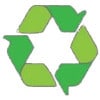by Rachel Aronson – JOFEE / Sustainability and Community Engagement Fellow, Hazon Jews across the world this week commemorated leaving Egypt to become free people for the holiday of Passover. Friends and family sit around the table together for the seder, celebrating freedom with comfy pillows to recline on and lots of kosher wine. Unfortunately, Passover can also represent something else: the holiday of waste. Those who keep kosher for Pesach (Passover) deep-clean our kitchens before the holiday, rooting out bread, tortillas, muffins, crackers, and every other kind of chametz (leavened or yeasted products) that’s sitting around the house. And to ensure that everything is kosher, we switch out our regular sets of dishes with a special set of only-for-Passover dishes. But who wants to keep an extra set of dishes around the house? It takes up storage space. It’s inconvenient. Understandably, many of us – out of convenience, or out of necessity – use disposable plates, cutlery, cups, and more. Ironically, many of us end up celebrating this holiday of freedom and liberation with trash bags full of styrofoam. Thankfully, Passover is also a holiday that reminds us of our ability to make change — as individuals and as a society. […]
Author Archive | Rachel Aronson

The People’s Climate March NYC
We’re only 6 weeks away from making history at what is expected to be the biggest climate march ever – the People’s Climate March NYC, on Sunday, September 21. I’m excited to have the opportunity to tell the world leaders who will be convening at the UN that now is the time to stop climate change. What is even more exciting is that this will surely be the biggest Jewish climate march ever. I have spent the last month reaching out to Jews across the country as we lay plans to march together. I am confident that we will start the new year with a big bang: We’re going to be coming out in force, with our shofars blasting. The People’s Climate March is taking place just a few days before we celebrate Rosh Hashanah. To me, there could not be a better way to prepare for the new Jewish year. Rosh Hashanah is “hayom harat olam,” the day the earth was born. It is the most universal of Jewish holidays. Unlike Passover and Hanukkah (to name just two), Rosh Hashanah is not about our particular Jewish story. It calls on us to reflect on our relationship to the earth […]

Can You Afford Going Green?
“We can’t afford it.” That’s a common response when I suggest that Jewish organizations reduce waste and pollution, protect health and safety, and demonstrate leadership in the transition to a greener world. But the truth is – you can afford it. It’s Free! Greenburgh Hebrew Center is saving money on electricity this summer, and reducing greenhouse gas emissions, by turning off the air conditioning in the social hall and holding the Shabbat kiddush in the lobby. Another no-cost step is to switch to green cleaning products that protect your members from toxic chemicals and reduce water pollution. They cost less because they are sold in concentrated form. The Jewish Community Relations Council, which rents office space in Manhattan, worked with the building management company to make the switch to green cleaning. Now all tenants benefit at no extra cost. Get a Grant. Kane Street Synagogue replaced 200 incandescent bulbs in the historic sanctuary with LED bulbs with the help of a generous subsidy from Con Ed. The congregation will recoup the cost in one year and reap the savings in electricity costs for the 10-15 year lifespan of the bulbs. Find out about opportunities for your organization to receive free […]

One Garden, Many Harvests
Seniors at the Boro Park Y just harvested their third crop of lettuce in the lobby! Everyone who comes into the Y is intrigued and excited by the new hydroponic garden. And the garden is growing more than produce – it is growing questions. “We had to ask a rabbi what blessing to say over it, because the lettuce is grown in water, not in the earth,” reports Ellie Kastel, Director of the Y. “Now we teach the children to say the blessing of she’ha’kol.” Ellie continues,“ The lights and the greenery have made the lobby a nicer environment. Teachers are bringing their classes to the Y to see the garden. Visitors are asking if they can do this at home. It is hard to convey the incredible impact this is having at the Y.” At the Sephardic Community Center, the Inter-generational Garden is growing relationships. This garden is planted in containers on the JCC’s patio and roof. Linda Eber, Greening Fellow, describes how children and seniors participate together. “One day a senior who does not speak English, and rarely interacts with others, came to the garden. We were able to match the senior with children who speak Arabic and […]

Imagining a Different Israel in the Shmita (Sabbatical) Year
Ruth Calderon, a member of the Knesset (the Israeli parliament), has a great idea for next year. No fishing will be allowed in the Sea of Galilee in order to allow the fish to recover from years of over-exploitation. Why next year? Because 5775, which begins this coming Rosh Hashanah, is a Shmita (Sabbatical) Year. Ruth’s idea for the Sea of Galilee is a contemporary application of the biblical instructions for Shmita. The basics of Shmita are straightforward: Those fortunate enough to control the use of resources are commanded to let the land lie fallow and release all debts. These commandments embody a profound truth, that unceasing work degrades both land and people. This degradation will eventually lead to oppression and inequality. The Shmita Year puts a brake on this process every 7 years, calling on us to invest in the sustainability of ourselves, our communities, and our society. I heard about Ruth’s proposal at the Siach Shmita Summit, a gathering of social justice and environmental activists from Israel, Europe, and the US, that took place just before Passover. All of the participants are finding ways to renew and reimagine the Shmita tradition. I came back from the Summit with […]

Speak Up! Advocacy for Systemic Change
What was Queen Esther thinking when her uncle Mordechai told her to speak up to King Achashverosh? Many readers of the Purim story have tried to answer this question with midrash (stories written to fill gaps in Torah texts.) One intriguing story claims that Esther hid for 4 years before the King’s agents found her and brought her to the palace. In this telling of the story, Esther wasn’t some firebrand eager to stand up against the ruling powers. She preferred to stay completely out of view. But when Mordechai told her it was up to her to go to the King, she stepped up to advocate for her community. There is a certain amount of greening that we can accomplish on our own. But eventually we realize that we’re part of a system. We need to change the system to accomplish our goals. At that point, like Esther, we have to speak up and advocate for what we believe in. At a recent JGF session, Ariel Bailey, Greening Fellow at the Heschel School, had a chance to speak up to Ron Gonen, the NYC Deputy Commissioner of Sanitation. NYC has a compost collection program for schools on the Upper […]

Change Takes Time
Four years after Miriam Massen proposed replacing the carpet in the social hall it was finally time to approve the project. But before a vote could be taken, a member of the Executive Committee had one more question about the new flooring: “But is it green?” Looking back, Miriam realized that her decision to talk about the congregation’s commitment to Jewish values of environmental stewardship at every opportunity had changed the culture. The leaders of Temple Israel of White Plains were now on board. Miriam, the Executive Director and Greening Fellow at Temple Israel, shared her story as part of a workshop on Leading Change at our most recent JGF training day. Influencing the culture of an organization takes time, and it can feel painfully slow when you are aware of the urgent need for change. In the workshop the Fellows made timelines of their greening journeys to enable them to reflect on how change is happening in their organizations and to recognize the progress they have made. In preparation for the workshop I spoke with several Senior Fellows about turning points in their organizations’ greening journeys. Their stories illustrate that you can only identify a turning point in hindsight. […]

ReSources You Can ReUse!
Have more fun and reduce waste on Purim with a costume swap. Or cut down on unhealthy eating by sending your friends carbon offsets for mishloach manot (gifts of food) instead of cookies and candy. You can offset with the Good Energy Initiative in Israel which helps low income Israelis replace water heaters powered by polluting kerosene with solar heaters. For more Purim tips go to Canfei Nesharim. Thinking even farther ahead, this year Earth Day falls on the 8th day of Passover, April 22, 2014. Celebrate appropriately with sustainability tips from Hazon, and resources from the Earth Day Network. Fair Trade Judaica, Equal Exchange, and T’ruah are collaborating to bring you fair trade, kosher for Passover, chocolate. Reconstructionist Synagogue of the North Shore sold out on fair trade Hannukah gelt this year. We are always looking for resources on organizational change that can help green leaders. Recently the JGF Fellows read John Kotter’s, Our Iceberg is Melting. This is a short book that addresses the steps in the change process. Read it together with your Green Team. Shira Kline, Jewish educator and performer, brings eco-music to a new generation with her CD: Earth Worm Disco. At a recent JGF […]

ReSources You Can ReUse!
Send a group of teens to the Youthbridge Teen Summit on March 7, 2014 to launch their own environmental justice project. Contact the Chas. C. Hart Seed Co. to request a donation of free seed for your garden. Bring Teva to your community for a winter eco-workshop (Jan-March) on Recycled Paper-making, Worm Bin Exploration, or Recycled Musical Instruments. Spring outdoor workshops, which can be held in a park near you, include Meet a Tree, Shma Sound Map, and Food Pickling & Preservation. Staff training and consultation are also available. Contact Yishai.Cohen@hazon.org. Aharon Ariel Lavi is a founder of Garin Shuva A Jewish Eco-Mission-Driven Community in the Negev. He speaks on Judaism, economics, social justice, and environmentalism. He is currently a Tikvah Fund Fellow in New York. Contact arilavi@gmail.com

Put the Shmita (Sabbatical) Year on Your Calendar
Have you ever dreamed about taking a sabbatical? Well now is your chance. Next year is the Sabbatical year, the Shmita, that the Torah commands us to observe every seventh year. But before you sign up for a cruise, take note that the Shmita of the Torah is not a year off. It is a year to reset our relationship to the earth and to each other. It is the original prescription for sustainability. Shmita calls on us to build communities that are healthy and just in three ways – socially, environmentally, and economically. With just a few more months until Rosh Hashanah 5775, now is the time to start thinking about how your community will observe the Shmita year. Here are seven ways to get started: 1. Let everyone know that Shmita is coming. A countdown clock is ticking in the main lodge at Isabella Freedman Jewish Retreat Center. 2. Start learning with your leaders. Bring a text about Shmita to your next Green Team, staff, or social action committee meeting. Go to ShmitaProject.org for resources. 3. Introduce Shmita to your community. At Solomon Schechter of Long Island, Rabbi Joshua Rabin prepared a Tu B’shvat seder on the theme […]

Environmental Justice Is Social Justice
You shall love your neighbor as yourself. —Leviticus 19:18 That which is hateful to you, do not do unto another. —Hillel The Catholic Climate Covenant asks a great question: “Who’s under your carbon footprint?” The question is a reminder that the environmental harm we cause has an impact on real people. This is something that is easy to forget when we talk about “the environment,” “the earth,” and “the atmosphere.” (Your carbon footprint is the amount of harmful emissions generated by your activities that are released into the atmosphere to worsen climate change.) A few weeks ago the JGF Fellows went on an environmental justice tour with Charles Callaway, Community Organizing and Outreach Coordinator at West Harlem Environmental Action (WEACT.) WEACT Charles showed us around his neighborhood; including the many dangerous and polluting facilities that are located there. West Harlem has a waste transfer station, a natural gas plant, and several bus depots. As Charles explained, waste has to go somewhere. And a lot of it ends up in low-income communities and communities of color that don’t have the economic and political influence to keep it out. This is the social justice issue at the heart of the environmental crisis. […]

The Miracle of Solar Energy
“In the case of mortal danger, where a person is within inches of death…being saved from death is a miracle and divine providence, and it is clear that everyone agrees that she should say a blessing.” —Nishmat Adam 1:65 Why do people get so excited about solar energy? I finally figured it out last week when I participated in a study session about how miracles are defined in Jewish law. In preparation for Hannukah the topic of our study session was miracles. Since ancient times there has been an ongoing debate about what miracle we celebrate on Hannukah. Perhaps the miracle is the military victory of the small band of Maccabees over a powerful enemy. Or, alternatively, the miracle is that when the Maccabees lit the menorah in the rededicated Temple one day’s supply of oil lasted for eight days. Was the miracle the human achievement or the supernatural occurrence? The definition of a miracle is a halachic matter (question of Jewish law) because the rabbis needed to decide when a person has to say a blessing of thanks for a miracle. As I followed the debate from generation to generation, guided by Rabbi Jason Rubenstein of Mechon Hadar, I […]

One Year After Hurricane Sandy: Prepare, Protect, and Prevent
“Enlightened stewardship is not only a religious and moral imperative; it is a strategy for security and survival.” —Coalition on the Environment and Jewish Life, Jewish Energy Covenant On the Friday before Hurricane Sandy hit, Karen Horowitz, Senior Greening Fellow at the Friedberg JCC, moved her computer hard drive from the floor to her desk. She saved the hard drive, but the JCC’s main building in Oceanside, Long Island, was closed for 3 months after the storm. And the early childhood center in Long Beach, flooded with 6 feet of water, has just reopened one year after Sandy. JCCs, congregations, day schools, and other community organizations rushed to help after Hurricane Sandy and they are still helping. Jewish Greening Fellowship organizations are among them: The Shorefront Y in Brighton Beach has disaster case managers and legal assistance on site. Met Council volunteers are distributing food packages and recovery information, and members of Congregation Beth Elohim are still preparing meals for displaced people. While the recovery continues, we must also prepare for the future. Climate change is changing the weather. Higher temperatures are loading storms with extra energy and rising seas mean more flooding from storm surges. Heat waves that are […]

ReSources You Can ReUse!
We want to make the JGF Update more useful for the 36 organizations that have completed the Jewish Greening Fellowship as well as all our other readers. Please send us links to resources that you’d like to recommend so that we can share them with the Jewish Greening Network. Met Council offers green volunteer opportunities for individuals and groups. Ask for the current brochure “40 for 40”. Contact JGF Alumna Stefanie Greenberg, Met Council’s Volunteer Department Manager, at sgreenberg@metcouncil.org. Jewish Education News published two issues on Eco-Judaism: Examining the Relationship Between the Environment and Judaism. Articles address every aspect of Jewish environmental education, and include many practical tips and curriculum ideas. International Walk to School Day is October 9, 2013. Organize an event to encourage active transportation and build awareness of the importance of walkable communities and reducing greenhouse gas emissions from car travel. Walk & Roll to School offers instructions for how to form a walking school bus or bike train. A new film, Symphony of the Soil is a great way to educate about composting. It examines the use and misuse of soil and highlights possibilities of healthy soil creating healthy plants, creating healthy humans, living on a […]

Powerful Jewish Learning & Living
“It is a learning in reverse order. A learning that no longer starts from the Torah and leads into life, but the other way round: from life, from a world that knows nothing of the Law…back to the Torah.” —Franz Rosenzweig, On Jewish Learning Where does food go when we throw it away? This may not sound like a Jewish question, but just ask the campers and counselors at the 14th Street Y’s New Country Day Camp. They spent this past summer immersed in Jewish learning and living inspired by the theme of composting. Powerful Jewish education starts with asking real questions that emerge from everyday life. There is no simple answer to the question of where food goes when we throw it away. As the campers learned, ideally the nutrients in food are returned to the soil and the cycle of life through composting. But more likely, our waste will end up in a landfill releasing dangerous gases. Every answer leads to another question, and ultimately to questions about why human beings act the way we do, and how we can take better care of each other and the earth. Children at New Country Day Camp were immersed in […]



